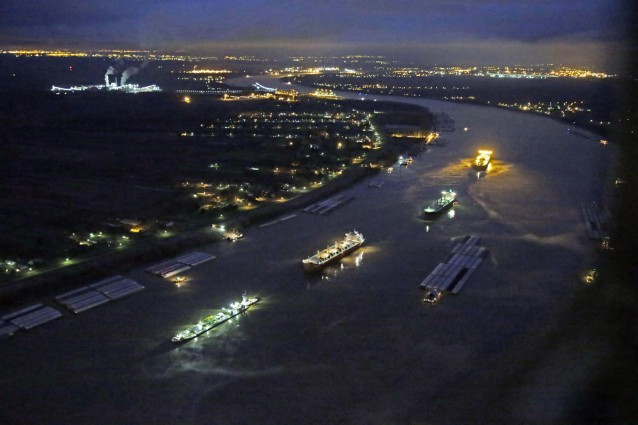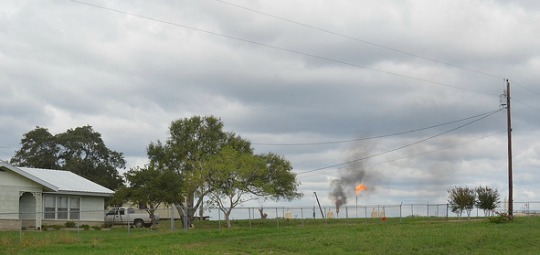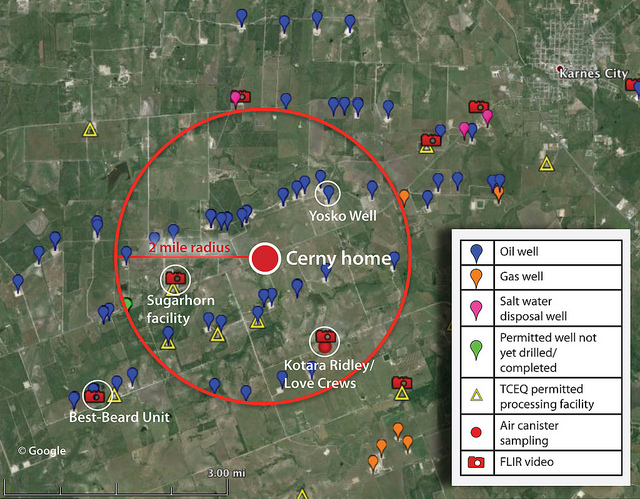video at:
http://www.nola.com/environment/index.ssf/2014/02/bp_deepwater_horizon_spill_oil.html?fb_action_ids=10152204442102698&fb_action_types=og.likes&fb_ref=s%3DshowShareBarUI%3Ap%3Dfacebook-like&fb_source=other_multiline&action_object_map=%5B124634777728610%5D&action_type_map=%5B%22og.likes%22%5D&action_ref_map=%5B%22s%3DshowShareBarUI%3Ap%3Dfacebook-like%22%5D
Nola.com

A school of bluefin tuna. A new study by scientists with Stanford University and the National Oceanic and Atmospheric Administration link oil from the BP Deepwater Horizon spill to heart damage in tuna and other marine species. (Richard Herrmann/Galatee Films)
By Mark Schleifstein, NOLA.com | The Times-Picayune
on February 13, 2014 at 3:03 PM, updated February 13, 2014 at 3:05 PM
Crude oil from the BP Deepwater Horizon spill contains a chemical that interferes with fish heart cells, slowing heart rates, reducing the ability of the heart to contract and causing irregular heartbeats that can lead to heart attacks or death, according to new research released Thursday by researchers at Stanford University and the National Oceanic and Atmospheric Administration.
The scientific paper, which will be published in the Feb. 14 edition of the journal Science, was discussed by several of the researchers at a news conference at the annual meeting of the American Association for the Advancement of Science in Chicago.
The research was conducted as part of the federal Natural Resource Damage Assessment process required by the Oil Pollution Act in the aftermath of the spill. Its findings will help federal and state officials, working with BP, to determine the extent of damages to natural resources from the spill and how those damages should be mitigated.
Researchers took samples of crude oil from the spill and tested the effects of tiny amounts mixed with water on living heart muscle cells of bluefin and yellow fin tuna.
The tests revealed that very low concentrations disrupted potassium ion channels in heart membranes that control the flow of molecules into and out of the heart cells that in turn regulate the electrical impulses that cause the heart to contract and relax.
The studies found that certain three-ring versions of polycyclic aromatic hydrocarbons found in the oil – which are also found in coal tar, creosote, air pollution and stormwater runoff from land – were what blocked the potassium ion channels, which increased the time it took for the heart to restart on every beat.
Tuna were chosen for the study in part because the BP spill occurred in an area of the Gulf of Mexico where Atlantic Bluefin tuna were spawning at the time of the accident.
The effects are believed to be more of a problem for fish embryos and early developing fish, because the heartbeat changes could also affect the development of other organs, including the lungs and liver, said Nathaniel Scholz, head of the Ecotoxicology Program at NOAA’s Northwest Fisheries Science Center in Seattle.
Adult fish have developed gill and liver systems that can detoxify the PAHs, he said.
He said similar secondary effects were found in other fish species in Alaskan waters in the aftermath of the Exxon Valdez oil spill in 1989, including cardiac edema and deformed spines.
The research also found that weathered oil contained more of the three-ring PAH compounds, and thus was more toxic to fish, said Barbara Block, a marine biologist at the Hopkins Marine Station of Stanford University in Pacific Grove, Calif.
Block’s research has included tracking individual tuna moving into and out of the Gulf of Mexico during spawning seasons. One of those tuna moved back and forth in a part of the Gulf adjacent to the site of BP’s Macondo well a year before the accident.
The study used four different samples of oil from the BP spill: oil taken directly from the riser pipe of the well, riser oil that was artificially weathered by heating, and samples collected from oil slicks by Coast Guard cutter Juniper on July 19 and July 29, 2010, about three months after the Deepwater Horizon accident.
Soon after the news conference, BP issued a statement raising questions about the study and the use of its conclusions in the damage assessment process.
“The paper provides no evidence to suggest a population-level impact on tuna or other fish species in the Gulf of Mexico,” the statement said. “Bathing isolated heart cells with oil concentrations is simply not comparable to the real-world conditions and exposures that existed in the Gulf for whole fish.
“The bodies of live tuna have numerous defensive mechanisms that isolated heart cells do not,” the statement said. “Equally important, the oil concentrations used in these lab experiments were rarely seen in the Gulf during or after the Deepwater Horizon accident.”
The statement said the paper also doesn’t include a realistic assessment of the exposure of fish to oil and its PAH constituents, “and it is scientifically inappropriate to take data from in vitro laboratory tests on isolated tuna heart cells and use it to make unsupported predictions about effects on a variety of live marine species or humans in the Gulf – effects that no one has observed or measured in the field.”
During the news conference, Scholz said other studies under way as partof the damage assessment are aimed at the exposure question.
Meanwhile, Jacqueline Savitz, a spokeswoman for the Oceana environmental group, said it was ironic the study finding Gulf fish “suffering from broken hearts” came on the eve of Valentine’s Day, but said the results are not surprisng.
“Fish larvae are generally more sensitive to the toxic effects of oil and other chemicals than adults,” Savitz said in a statement. “Even in a healthy ocean, only a small fraction of larval fish have what it takes to make it to adulthood. So after a spill, toxic chemicals in the oil could wipe out some of the few fish that might have otherwise succeeded, which could be a major setback to a species in need of recovery like bluefin tuna.”
She said the study backs up her group’s concerns that offshore drilling remains unsafe.
“This and other studies on the impacts of the spill, underline the importance of breaking our oil addiction and not expanding offshore drilling into the Atlantic or the Arctic,” Savitz said.
The research paper concludes that the effects seen in tuna are likely to occur in other vertebrates found in the Gulf of Mexico, including shrimp and other fish species, marine mammals and turtles.
The paper also warns that the scientists’ findings may also indicate a threat to human health resulting from exposure to PAHs in air pollution, including from car exhausts.
“The protein ion channels we observe in the tuna heart cells are similar to what we would find in any vertebrate heart and provide evidence as to how petroleum products may be negatively impacting cardiac function in a wide variety of animals,” Block said in a news release announcing the paper. “This raises the lpossibility that exposure to environmental PAHs in many animals – including humans – could lead to cardiac arrhythmias and bradycardia, or slowing of the heart.”
Special thanks to Richard Charter



